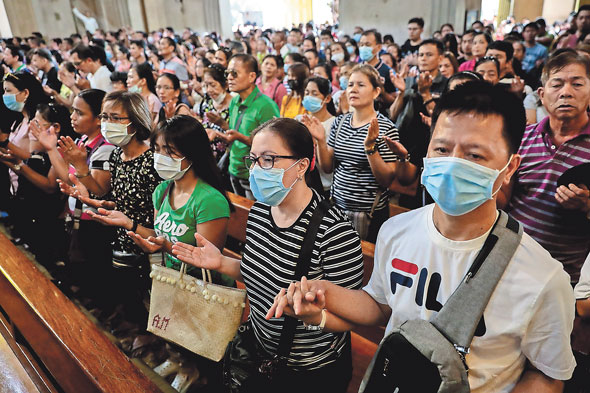
My dear brothers and sisters in the Lord,
On Wednesday, we imposed ashes with the words, “Remember that you are dust and unto dust, you shall return.” These words remind us of the inconvenient fact that each one of us someday will die. Lent is a time when we learn to die to ourselves through prayer, fasting and almsgiving, while at the same time preparing ourselves for our eventual death.
In these days, we are all concerned about the coronavirus epidemic, which we pray will not become a pandemic. We find ourselves in a time when we must be very concerned about the health of nations throughout the world. During the beginning of an epidemic, unfortunately, we see people looking to blame others. Perhaps a nation for delaying information on the virus, or in this case, anyone of Chinese heritage who in some way might be held responsible for the virus. As we begin this Lent, we must reflect on how we look upon our neighbors.
One story that perhaps might put into perspective how we can react to pandemics, which are worldwide health crises, may be relevant in today’s world. When I was a little boy of 9 or 10 years old, I noticed that each year a man would come to visit my maternal grandmother, Angelina, and bring her a small gift. One year, I asked her, “Why does this man come to see you every year?” My grandmother replied and told me the story of why he visited her each year.
The pandemic of the Spanish Flu from 1918 to 1919 was a terrible time when 600,000 people died in the United States alone. Worldwide, the death toll was in the millions. In the tenements where my grandmother lived in Newark, New Jersey, a neighbor’s parents both died of the flu and left their only son orphaned. It was this orphaned son who came to visit my grandmother every year to thank her and remember that it was she who was the only person who would prepare the bodies of the flu victims for burial, most especially his own parents.
My grandmother Angelina, illiterate yet very intelligent, was a 5-foot-tall farm girl from Italy who was afraid of no one or anything. She also had a great gift of love for others. Truly, I can picture her at that time volunteering to do all that she could to assist others during that terrible situation.
It is interesting to know that my mother, Grace, was born in October of 1919 when the pandemic had just subsided because it started in October of 1918 and lasted into the spring of 1919. Angelina risked contamination even during her pregnancy. We can only imagine her motivation for such heroic action.
In our day and age, we must recognize that we are not to assess blame. Each year when we come to Lent, we recognize our sinfulness. We do not blame anyone else for our sins. We must take responsibility for our sins. Our Holy Father, Pope Francis, in his message this year for Lent, tells us that the basis of conversion is inserting ourselves into the Paschal Mystery, meaning that we follow the life and death of Jesus Christ. Jesus offered His life for each and every one of us. In a certain sense, we also must be willing to offer and sacrifice for others. This time of Lent, under these circumstances, gives us a great opportunity to do just that this year.
Pope Francis continues to mention the urgency of conversion. We can only change when we ask God for help. That is why prayer is so important during Lent. The Holy Father says, “Even more than a duty, prayer is an expression of our need to respond to God’s love which always precedes and sustains us.” Prayer is our means of conversion and change.
Pope Francis reminds us, which is so appropriate for our situation today, “Despite the sometimes tragic presence of evil in our lives, and in the life of the Church and the world, this opportunity to change our course expressed God’s unwavering will not interrupt his dialogue of salvation with us.” God is constantly calling us back to Himself. We are reminded by the Holy Father, quoting Matthew 5:43-28, “For God also loves His enemies.” How true it is that we must love our enemies as God loves us. We are not to make others enemies, but we are to find in them always friends.
Finally, the Holy Father’s Lenten message reminds us of almsgiving. He says, “Charitable giving makes us more human…” Yes, there may be some point if this flu becomes a pandemic that we may need to offer charity. We know already the Holy See has sent material to China to help contain the virus.
As we put out into the deep this Lent, our work is one of prayer, fasting and abstaining from what we do not need, thus perhaps then giving back to others in almsgiving. This reminds us all that this world will pass away and that we will pass away also. But it is a wake-up call reminding us that we have a duty to support one another as the children of God, no matter where we are in the world.
Today we especially pray for all of the victims of the coronavirus.
Follow Bishop DiMarzio:
Twitter @BpDiMarzio
